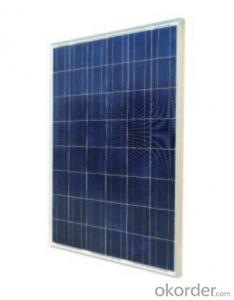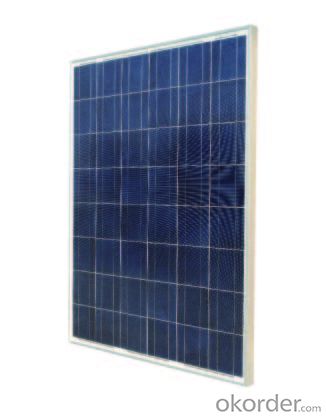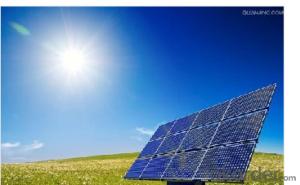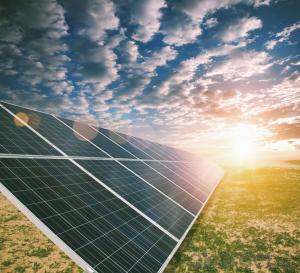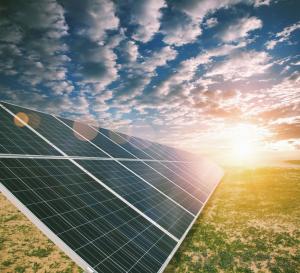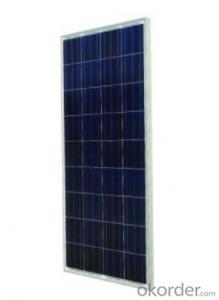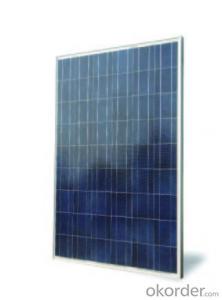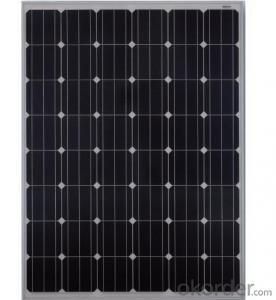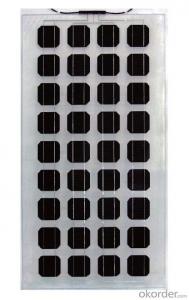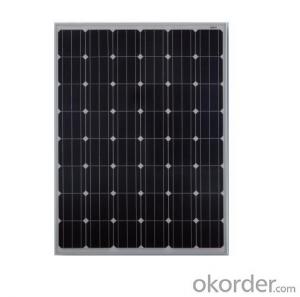Mono Versus Poly Solar Panels - Poly Crystalline Solar Panel RS195(P)-48
- Loading Port:
- China main port
- Payment Terms:
- TT OR LC
- Min Order Qty:
- 2000 watt
- Supply Capability:
- 1000000 watt/month
OKorder Service Pledge
OKorder Financial Service
You Might Also Like
Quality Assurance
10 Years Material & Craft
Power Guarantee
12 Years 90% Output
25 Years 80% Output
ISO9001:BSI
ISO14001:BSI
OHSAS18001:BSI
High Module Efficiency
Mechanical Load Capability up to 8000 Pa
Salt Mist Corrosion Protect Ammonia Resistance
Potential Induced Degradation Free
RS195P-48
RS185P-48
RS190P-48
RS200P-48
RS205P-48
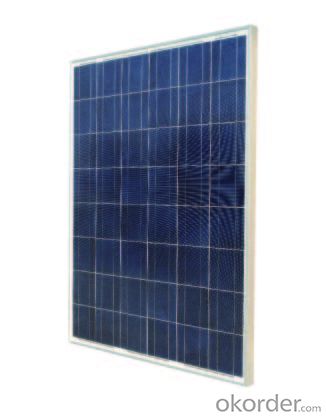
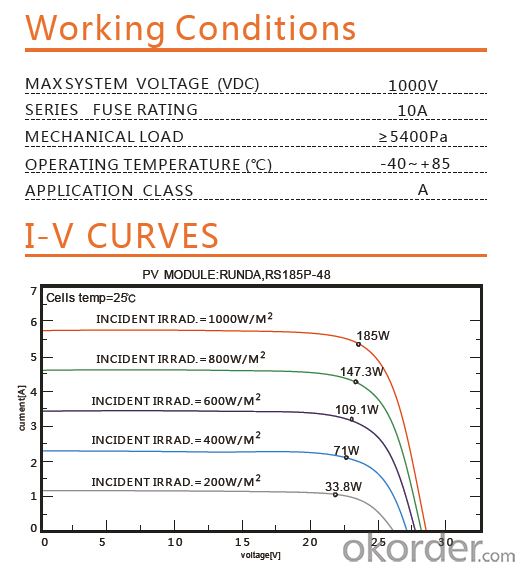
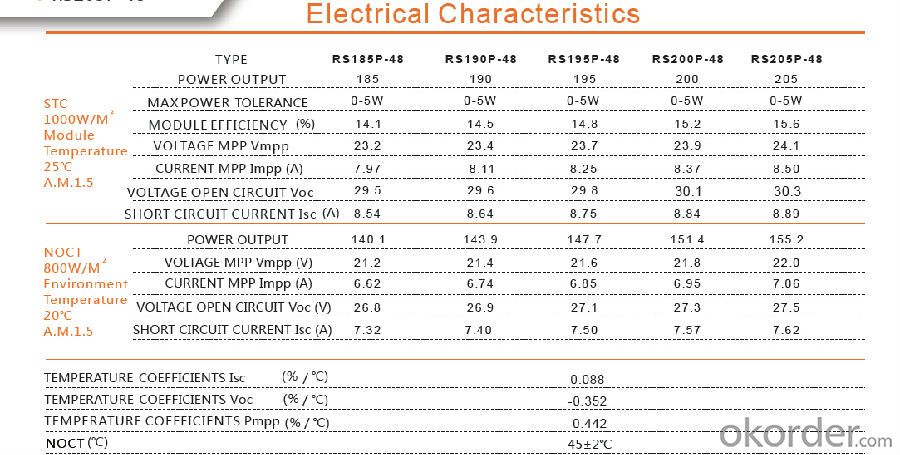
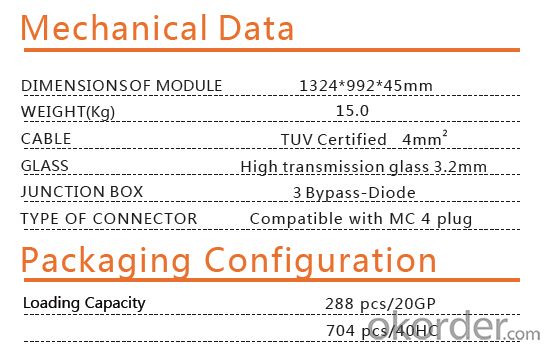
Structure of Solar Panels Description
Solar panel refers either to a photovoltaics (PV) panel, a solar hot water panel, or to a set of solar photovoltaics panels electrically connected and mounted on a supporting structure. A PV panel is a packaged, connected assembly of solar cells. Solar panels can be used as a component of a larger photovoltaic system to generate and supply electricity in commercial and residential applications. Each panel is rated by its DC output power under standard test conditions, and typically ranges from 100 to 320 watts. The efficiency of a panel determines the area of a panel given the same rated output – an 8% efficient 230 watt panel will have twice the area of a 16% efficient 230 watt panel. There are a few solar panels available that are exceeding 19% efficiency. A single solar panel can produce only a limited amount of power; most installations contain multiple panels. A photovoltaic system typically includes a panel or an array of solar panels, an inverter, and sometimes a battery and/or solar tracker and interconnection wiring.
Efficiencies
Depending on construction, photovoltaic modules can produce electricity from a range of frequencies of light, but usually cannot cover the entire solar range (specifically, ultraviolet, infrared and low or diffused light). Hence, much of the incident sunlight energy is wasted by solar modules, and they can give far higher efficiencies if illuminated with monochromatic light. Therefore, another design concept is to split the light into different wavelength ranges and direct the beams onto different cells tuned to those ranges. This has been projected to be capable of raising efficiency by 50%. Scientists from Spectrolab, a subsidiary of Boeing, have reported development of multijunction solar cells with an efficiency of more than 40%, a new world record for solar photovoltaic cells. The Spectrolab scientists also predict that concentrator solar cells could achieve efficiencies of more than 45% or even 50% in the future, with theoretical efficiencies being about 58% in cells with more than three junctions.
FAQ of Solar Panels
Q1:Can we visit your factory?
A1:Sure,welcome at any time,seeing is believing.
Q2:Which payment terms can you accept?
A2:T/T,L/C,Moneygram,Paypal are available for us.
Q3:How to guarantee the Quality of the products?
A3:We have established the international advanced Quality management system,every link from raw material to final product we have strict Quality test;We resolutely put an end to unQualified products flowing into the market. At the same time, we will provide necessary follow-up service assurance.
- Q: Can solar panels be used to power a gas station?
- Yes, solar panels can be used to power a gas station. Solar energy can be harnessed through the installation of solar panels on the roof or in the vicinity of the gas station. This renewable energy source can then be used to power various operations and equipment at the gas station, reducing reliance on non-renewable energy sources and lowering overall operational costs.
- Q: how much energy does a kilowatt solar panel produce in a year? (average)
- You would be amazed how often I have answered this question. The answer is that it depends on your latitude and local weather . Let's see if I can give you enough information so that you can determine the answer for yourself. A kW solar panel is rated at kW when it is exposed to a solar flux of kW/m^2 (called a peak sun hour). There are readily available tables of effective peak sun hours per day by city (see Reference ). Let's use Fairbanks, AK as an example (it is the first line of the table). Fairbanks get an average of 3.99 of peak sun hours per day on average. So your panel would produce 3.99 kW*hr per day on average.
- Q: What is the warranty on solar panels?
- The warranty on solar panels typically varies between 10 to 25 years, depending on the manufacturer.
- Q: Can solar panels be installed on public transportation systems?
- Yes, solar panels can be installed on public transportation systems. In fact, many cities around the world have already started implementing solar panels on buses, trams, and trains. This allows the vehicles to generate renewable energy and reduce their carbon footprint while operating. The solar panels can be integrated into the roofs or sides of the vehicles, harnessing sunlight to power various onboard systems, such as lighting or air conditioning. This not only helps to make public transportation more sustainable but also saves on energy costs and promotes a greener future for urban mobility.
- Q: I am looking at a need of roughly 30w/hour need per 24 hour period. I have spent several hours now looking for information online and have found plenty of info regarding the panels themselves, but information regarding the batteries backups have been slim. I understand that there is a 5-7 hour peak time to collect the energy. I am looking for information regarding the batteries themselves. How do the batteries work, what size batteries should I look for, and what is the life expectency for the batteries? Any website links would also be appreciated!
- Solar panels have their own characteristics and generate current depending on the intensity of sunlight falling on them and not on the temperature. Direction of the panel also makes lots of difference. Nowadays very thin panels are available at very high cost. The more area a panel occupies it generates more current. The current generated by a panel cannot be readily used since the current and voltage varies with the load connected to it. So normally a regulator is used to have constant voltage and constant current to come from the panel. This charges the battery. You have to calculate the total/normal current from the charger and then find the AH of the battery. When you have calculated the AH of the panel/charger then you can divide the AH of the battery by the AH of the charger/panel and find out the time taken to fully charge the battery. You also have to remember that there is a de-rating factor to be taken into consideration in the battery.
- Q: I am starting to think about solar panels as an option for my home. I have done some research on panels, to be honest its all very confusing. There are many different panels some with 60 watts some all the way up to 20 watts. My household currently uses about 2700 to 3400 kWh every two months. So based off of my power usage maybe you can answer some of the following questions:What kind of panels should I be looking at?Which panel manufacturers give the best bang for the buck (reliable/affordable)?Anything else I should be concerned about?I am just starting out in educating myself on solar power so please excuse me if I sound very naive. Any information that you may have will be helpful. Thanks in advance.
- I'm not an expert, but I recently went through the process and now have a system on my home. I got 3 quotes from 3 licensed contractors and they all seemed to be about the same, the prices seemed to be based on the amount of energy they produced. In CA and I'm sure everywhere else they are tested by an independent agency which rates the output of the panels. You seem to have similar usage as my house, I got a 3.75kwhdc unit, it isn't expected to eliminate my bill, but it should reduce it by quite a bit. I've only had it for a few months and it took me from about 45 kwh per day to around 0. I know I'll have lower output in the winter, but my usage is lower in the winter as well. I decided on this size unit to maximize my rebates and I can take advantage of my utilities rebates when I add to the system in a few years. The difference between panels seemed to be how big they were. Some systems can be twice the size and produce the same amount of energy. I put a couple links below that I found helpful. The roseville pv buy down program has some great links that give information about specific systems.
- Q: Here's a little idea I though might help everyone out in Iraq a little: How about if the US mass produces solar panels that are small enough to carry (maybe one foot by three feet) that have a regular power outlet on them to the Iraqis? We could send convoys to the people waiting in line to buy gas and give each person one free solar panel. Why?. A lot of people are buying gas to run generators for air conditioning, not to fuel vehicles. 2. It would help reduce the gas lines if people only needed gas for cars instead of their generators too.3. It would help reduce the fighting over the power grid if people didn't need the grid for their own electrical power.My theory is, once every family in Iraq has enough of these panels that they don't even care about the power grid (during the daytime anyway) it would be much easier to fix the power grid. Maybe these solar panels could even connect to and add to the power grid.
- I have a better idea . Why don't we pull our troops out of there and take the money that we spend to kill people and build a mass amount of solar cells and hand them out to our own people maybe give one of our hungry people a little food to go with it . You could even take a little of that money and put some kids through college . I can think of thousands of things to do with that cash . Why don't we ever take care of our own people first ?
- Q: How do solar panels affect roof weight load?
- Solar panels can increase the weight load on a roof, but modern solar panel systems are designed to distribute the weight evenly and not exceed the load capacity of the roof.
- Q: I am planning to buy some solar panels for my cabin and i want to be able to store the electricity. what kind of batteries should i get? i will be running simple things like a tv and radio. where can i buy these batteries? where should i look for the best batteries?
- Deep cycle, Golf Cart Batteries. You can get them at a battery store.
- Q: How do solar panels affect the local economy?
- Solar panels can have a positive impact on the local economy by creating jobs in the installation, manufacturing, and maintenance sectors. Additionally, the use of solar energy can reduce electricity costs for residents and businesses, freeing up funds that can be spent elsewhere in the local economy. The deployment of solar panels can also attract investments and contribute to the growth of a sustainable and eco-friendly image for the community, potentially boosting tourism and attracting new businesses.
Send your message to us
Mono Versus Poly Solar Panels - Poly Crystalline Solar Panel RS195(P)-48
- Loading Port:
- China main port
- Payment Terms:
- TT OR LC
- Min Order Qty:
- 2000 watt
- Supply Capability:
- 1000000 watt/month
OKorder Service Pledge
OKorder Financial Service
Similar products
Hot products
Hot Searches
Related keywords
